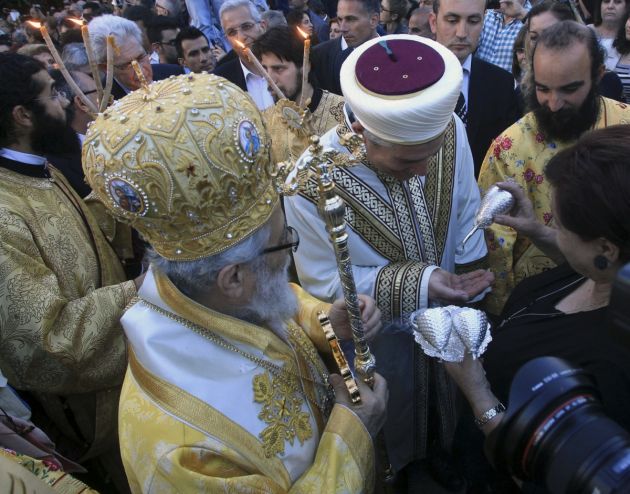Greek Christians mark rare Good Friday in Turkish north Cyprus

FAMAGUSTA, Cyprus (Reuters) - Hundreds of Greek Orthodox pilgrims, some coming home after 40 years of forced exile, commemorated the crucifixion of Jesus in a rare Good Friday service in northern Cyprus on Friday.
Held in this medieval walled city in the Turkish part of the divided island, the ceremony at the 14th-century St. George Extorinos church was the idea of local authorities who invited the faithful from the Greek part of the island to visit.
The traditional procession of an icon of Jesus, which would normally be openly paraded through the streets of a Greek neighbourhood, was limited to the church grounds for security reasons and guarded by a strong police presence.
"This is one of the happiest days of my life," said Anna Marangou, a Greek Cypriot archaeologist and historian who lived in Famagusta until her family was forced to flee in 1974.
"This is a grassroots movement with significance to people and what we are capable of achieving."
George Anastasiou, a retired civil servant, had mixed feelings about being back in the once popular tourist town that four centuries ago inspired Shakespeare's tragedy "Othello".
"I haven't been back for 40 years, and wouldn't have come if it weren't for the liturgy," he said. "I have mixed feelings - all my memories are locked up here."
Some 45,000 Greek Cypriots fled Famagusta in the 1974 fighting, a conflict that uprooted tens of thousands from both communities across the island.
Greek Cypriots and Turkish Cypriots now live separated by a United Nations-controlled buffer zone. Virtually unhindered crossing from one side to the other started only a decade ago.
Alexis Galanos, the Greek Cypriot mayor-in-exile of the sprawling coastal city, said this week he hoped the Good Friday service can be a precursor to lasting peace.
"It gives a message of reconciliation and cooperation of Greek and Turkish Cypriots throughout Cyprus, and particularly for a reunified Famagusta," he said.
Liturgies at St. George Exorinos stopped a few years before Cyprus gained independence from Britain in 1960, after clashes between Greek and Turkish Cypriots broke out.
The church building is now used by a local Turkish Cypriot university as an arts workshop. Many other churches have been converted into mosques after the island was split into Muslim Turkish and Christian Greek parts.
(Reporting By Michele Kambas; Editing by Tom Heneghan)